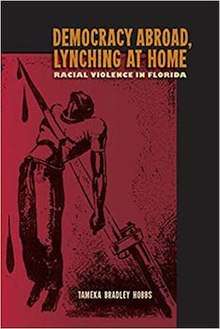Democracy Abroad, Lynching At Home
Democracy Abroad, Lynching At Home: Racial Violence In Florida is a 2015 history book by Tameka Hobbs. In it, Hobbs discusses the national and international implications of mid 20th century Florida lynchings, concentrating on the lynchings of Arthur C. Williams, Cellos Harrison, Willie James Howard, and Jesse James Payne.
 | |
| Author | Tameka Hobbs |
|---|---|
| Country | USA |
| Language | English |
| Subject | History of Florida |
| Published | 2015 (University Press of Florida) |
| Media type | Print (hardback) |
| Pages | 273 |
| Award | 2015 Bronze Florida Book Award |
| ISBN | 9780813062396 |
| OCLC | 892431968 |
| Text | Democracy Abroad, Lynching At Home: Racial Violence In Florida at Wikisource |
Contents
- Lynched twice: Arthur C. Williams, Gadsden County, 1941
- A Degree of Restraint: The Trials of Cellos Harrison, 1940-1943
- The Failure of Forbearance: The Lynching of Cellos Harrison, Jackson County, 1943
- "A Very Cheap Article": The Lynching of Willie James Howard, Suwannee County, 1944
- Still At It: The Lynching of Jesse James Payne, Madison County, 1945
- Conclusion
- Epilogue. Strange Fruit, Bitter Seeds: The Echoes of Lynching Violence.
Reception
W. Fitzhugh Brundage, writing in The Journal of American History, states that although "The book focuses on only four lynchings that occurred in Florida during the 1940s,...", "Tameka Bradley Hobbs makes a convincing argument that these lynchings reveal important insights into the evolution of white supremacy in twentieth-century America.".[1] A reviewer in The Florida Times-Union wrote "An important insight of “Democracy Abroad, Lynching at Home” is the long-term psychological damage suffered by blacks who experienced white violence during the Jim Crow era.".[2]
Democracy Abroad, Lynching At Home has also been reviewed by H-Net,[3] The American Historical Review,[4] and the Journal of Southern History.[5]
It received a bronze medal in the non-fiction category of the 2015 Florida Book Awards.[6]
References
- "Democracy Abroad, Lynching at Home: Racial Violence in Florida". The Journal of American History. Oxford University Press on behalf of the Organization of American Historians (United States). 103 (3): 823–824. December 2016. doi:10.1093/jahist/jaw453. Retrieved July 10, 2019.
- Michael Hoffman (November 28, 2015). "Book Review: 'Democracy Abroad, Lynching at Home: Racial Violence in Florida' by Tameka Bradley Hobbs". The Florida Times-Union. Retrieved July 10, 2019.
- Brandon Jett (February 2016). "Jett on Hobbs, 'Democracy Abroad, Lynching at Home: Racial Violence in Florida'". networks.h-net.org. Humanities and Social Sciences Online. Retrieved July 10, 2019.
Democracy Abroad, Lynching at Home is not so much a study of the causes of lynching in 1940s Florida, but is instead more concerned with the reactions, both local and national, that each lynching garnered. By placing her study in an international context, Hobbs contributes to the emerging trend within the historiography that seeks to understand lynching and mob violence in relation to global trends
- Michael J. Pfeifer (October 4, 2016). "Tameka Bradley Hobbs. Democracy Abroad, Lynching at Home: Racial Violence in Florida". The American Historical Review. Oxford University Press for the American Historical Association (United States). 121 (4): 1309–1310. doi:10.1093/ahr/121.4.1309. Retrieved July 10, 2019.
Tameka Bradley Hobbs’s well-written and well-researched book offers in-depth case studies of four lynchings that occurred in Florida in the early to mid-1940s.
- Mari N. Crabtree (November 3, 2016). "Democracy Abroad, Lynching at Home: Racial Violence in Florida by Tameka Bradley Hobbs". Journal of Southern History. 82 (4): 950–951. doi:10.1353/soh.2016.0286.
Tameka Bradley Hobbs argues that the geopolitical context of World War II accounts for not only the shift in public opinion on lynching but also the decline in the number of lynchings. ... Hobbs also provides valuable insights into the devastating impact of lynching on African American families and communities over the past seventy-five years.
- "Congratulations to our 2015 Florida Book Awards Winners!". floridabookawards.lib.fsu.edu. February 1, 2011.